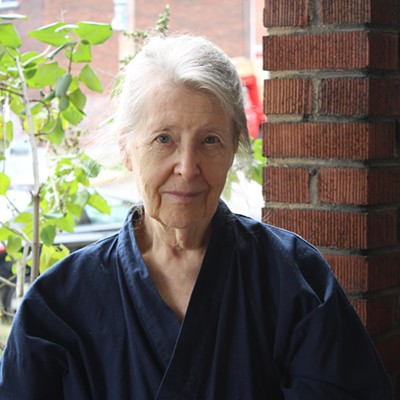Revisiting old haunts is a specialty of Hilary Masters. The acclaimed writer's new novel, Elegy for Sam Emerson (Southern Methodist University Press), is set in 1999 in Pittsburgh, its hero a 70-year-old Mount Washington restaurateur with a dying mother and a younger lover. But half the book unspools in chapter-ending "program notes" exploring Emerson's boyhood and young adulthood. These take place mostly in Manhattan ... where Emerson visits his mother, a famous actress, and sometimes his father, a renowned war photographer ... and in East Liverpool, Ohio, where he was raised by his waitress aunt. Masters, 78, a longtime professor of English and creative writing at Carnegie Mellon University, is best known for his 1982 memoir Last Stands: Notes From Memory, which chronicles life as the son of poet Edgar Lee Masters. On vacation with his wife, the writer Kathleen George, Masters spoke by phone from Providence, R.I., where he's been visiting summers for more than half a century.
Your protagonist is very fond of Pittsburgh.
It's where he's had a lot of success. He likes that whole sense of the energy. I tried to picture what I feel is the energy in Pittsburgh, and it's still there even though the mills are down.
Why Mount Washington?
I love going up there and looking down on the city from that angle. I gave him a kind of sense of overviewing his whole history, if you will, and his success, being up there on top now, and feeling every now and then that he was in control of stuff, although realizing later that he wasn't in control of anything, and that there were things he just couldn't manage ... like Phoebe [his lover], for example. He could see where she lives, and visualize her kind of moving around down there by the river. But in the long run he realizes that he can't manage her. She's her own woman.
There's separateness too: the distant observer.
Because of his peculiar arrangement, living with his aunt in East Liverpool, rather than with his mother or father, he became kind of an observer.
How did you hit on the "program notes"?
'Cause [Emerson's] mother was an actress. So I used that form, and that meant that I didn't have to make a really long narrative. Just kind of little notes, little odds and ends of things that occurred to him in his past.
It's half the book!
Well, the past is a major part of our life.
The fragmentation of time recalls Last Stands.
It was a way of dealing with the narrative that was really set in the past. I keep thinking that St. Augustine, in his memoir, Confessions, said that the past is all we know of the present. When we go back we try to recapture things in the past, and we add things to them. Our imaginations fill in the gaps. It's not really a very reliable history, when you think about it.
In Elegy, you say of Emerson's mother, "Like all memoirists, she carefully reassembled the elements of the past so the final version of an event would possess a truth the original lacked."
We settle scores, that sort of thing [laughs]. My mother did that. Everybody does that. Make it come out right, if you will.
Elegy does echo your own story.
Oddly enough, here we are in the period of the so-called phony memoir, and so with the novel, I don't pretend. I say, "This is fiction, but I'm using stuff of the facts." I'm turning the memoir into novel, in a sense. Aunt Rho is clearly my grandmother, from Last Stands. And the mother clearly has elements of my own mother, and my own kind of funny fragmented childhood.
Emerson values keepsakes, but his mother purges them ... just like your grandfather in Last Stands, burning all his possessions.
We all have different motives. My grandfather's idea of traveling light: just keep your saber and your pistol, and that's it.
The past is a difficult thing to deal with. It can be also very refreshing and rewarding and instructive. It certainly can be instructive, if you pay attention to it. And unfortunately our government is not doing that, to introduce a political mode here.
Why did you include a Jonny Gammage-like subplot ... Sam's colleague's nephew, a young African American killed by police on a traffic stop?
The whole book is pre-9/11, and the elegy, in part it's looking back on a time when things were different, when things were happening. So I wanted to include that aspect, that horrible thing that happened in Pittsburgh. Because that's part of the tapestry of not just Pittsburgh but almost any big city in America.
What are you reading?
I've been reading Joan Didion lately, and re-reading Wright Morris. He's a wonderful novelist. He died about 10 years ago. Actually, all my interest in [the] past comes from him, to some degree. So I've been re-reading some of his essays.
I'm at the point where I re-read a lot of stuff more than read new things. Which is probably a mistake. It's probably indicative of my age or something.













